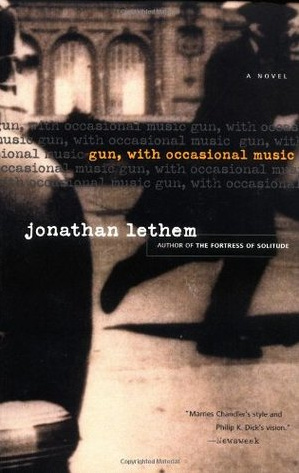

Jonathan Lethem · 271 pages
Rating: (8.6K votes)
“Some people have things written all over their faces; the big guy had a couple of words misspelled in crayon on his.”
― Jonathan Lethem, quote from Gun, With Occasional Music
“Apologies aren't something you want to get in the habit of practicing in the mirror”
― Jonathan Lethem, quote from Gun, With Occasional Music
“I jotted the name down mentally on that tattered notepad I call a memory. The pen skipped.”
― Jonathan Lethem, quote from Gun, With Occasional Music
“But the day I can't shrug off a twinge of self-pity, is the day I'm washed up for keeps.”
― Jonathan Lethem, quote from Gun, With Occasional Music
“Nobody said anything while I opened the bag and took out the egg salad sandwich. It was one of those funny moments when a bit of normal human activity embarrasses everybody out of their bluster and hostility, and roles are momentarily laid aside.”
― Jonathan Lethem, quote from Gun, With Occasional Music

“I'd underestimated him. I assumed anyone who started out gut-punching you in an elevator couldn't have all that much else in his arsenal. For instance, I had no idea he could smile, let alone at such an inappropriate time.”
― Jonathan Lethem, quote from Gun, With Occasional Music
“I was playing it existential, and maybe a bit stupid, but it was the only way I knew how to play it.”
― Jonathan Lethem, quote from Gun, With Occasional Music
“The dentist swiveled on his heels and disappeared, leaving me there to massage my jaw back into feeling after its brief, masochistic marriage to the top of my wooden desk.”
― Jonathan Lethem, quote from Gun, With Occasional Music
“He couldn't be more than twenty-five, but he obviously lived enough to have things to regret. He looked like he'd taken a long fall a short time ago. Pieces of the man he'd been were jumbled up with the new guy, the lost soul.”
― Jonathan Lethem, quote from Gun, With Occasional Music
“The clouds were still bunched up in the sky like a gang on a street corner, and it looked to me like they had the sun pretty effectively intimidated.”
― Jonathan Lethem, quote from Gun, With Occasional Music

“Sometimes it’s better not to think in questions, but I can’t seem to get out of the habit.”
― Jonathan Lethem, quote from Gun, With Occasional Music
“How’s it feel to be a worthless jumbo diddly-ass puppetool?”
― Jonathan Lethem, quote from Gun, With Occasional Music
“One good thing about jail is that it allows you to think a lot.”
― John Grisham, quote from The Client
“There's so much I wish for these days, but most of all, I wish you were here. It's strange, but before I met you, I couldn't remember the last time that I cried. Now, it seems that tears come easily to me...but you have a way of making my sorrows seem worthwhile, of explaining things in a way that lessens my ache. You are a treasure, a gift, and when we're together again, I intend to hold you until my arms are weak and I can do it no longer. My thoughts of you are sometimes the only things that keep me going.”
― Nicholas Sparks, quote from Nights in Rodanthe
“Sometimes the truth is arrived at by adding all the little lies together and deducting them from the totality of what is known.”
― Terry Pratchett, quote from Going Postal
“I guess we're even,Sadie.First,Walt and I rushed off to save you in London.Then,you and Walt rushed off to save me.The only one who got shafted on both deals was Walt.Poor guy gets hauled all over the world pulling us out of trouble”
― Rick Riordan, quote from The Throne of Fire
“If I tell you a secret can you keep it quiet?
“Well, I can. I’m not so sure about Doll Girl.”
― Brent Weeks, quote from The Way of Shadows
BookQuoters is a community of passionate readers who enjoy sharing the most meaningful, memorable and interesting quotes from great books. As the world communicates more and more via texts, memes and sound bytes, short but profound quotes from books have become more relevant and important. For some of us a quote becomes a mantra, a goal or a philosophy by which we live. For all of us, quotes are a great way to remember a book and to carry with us the author’s best ideas.
We thoughtfully gather quotes from our favorite books, both classic and current, and choose the ones that are most thought-provoking. Each quote represents a book that is interesting, well written and has potential to enhance the reader’s life. We also accept submissions from our visitors and will select the quotes we feel are most appealing to the BookQuoters community.
Founded in 2023, BookQuoters has quickly become a large and vibrant community of people who share an affinity for books. Books are seen by some as a throwback to a previous world; conversely, gleaning the main ideas of a book via a quote or a quick summary is typical of the Information Age but is a habit disdained by some diehard readers. We feel that we have the best of both worlds at BookQuoters; we read books cover-to-cover but offer you some of the highlights. We hope you’ll join us.